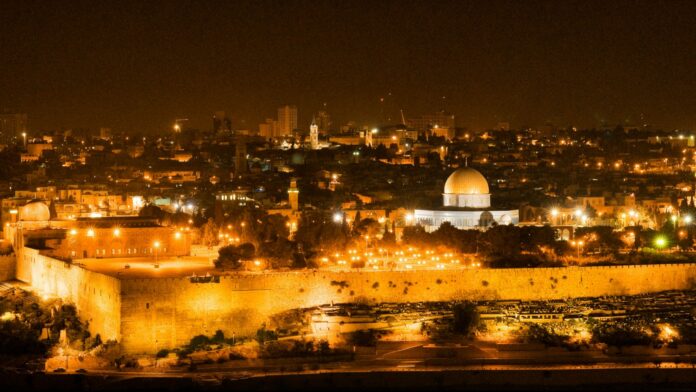This article was first published in The Jerusalem Post.
In what parallel universe could the visit of a Jewish politician to Judaism’s most holy site be considered controversial?
To those uninitiated in the Orwellian fantasy world of Palestinian politicking, a Jew praying at the site of Israel’s ancient temples seems as natural and unremarkable as the wetness of water or the “Catholicness” of the Pope. But to those indoctrinated into the Palestinian narrative, the visit of an Israeli politician to the most holy site in Judaism is seen as highly provocative, risking a violent Palestinian reaction and deserving of a special meeting of the United Nations Security Council – the world body tasked with monitoring the world’s sensitive hotspots. While the violent uprising did not occur, the UNSC did indeed meet. Never mind the Russia-Ukraine War, the deteriorating human rights situation in Iran or nuclear weapons development by Iran and North Korea. All these were apparently trumped by an Israeli politician having the audacity to visit Judaism’s most holy site.
Israel’s new right-wing National Security Minister Itamar Ben-Gvir’s thirteen minute peaceful visit to the Temple Mount was described by Arab states as ‘“storming of Al-Aqsa Mosque courtyard.” The false accusation that the visit was an attempt to change the status quo and the general outrage directed towards the incident ignores the fact that Jews have a right to visit the Temple Mount according to the agreement between Israel and Jordan following the 1967 war. Israel had gained control of the Temple Mount, but her leaders chose to preserve the status quo regarding the Al-Aqsa compound, thus giving custodianship responsibilities for administration and religious arrangements to Jordan, while retaining responsibility for security and public order. Many now regard this concession, offered in the hope of alleviating the conflict, as a mistake.
Jews are only allowed to visit the Temple Mount at specified times, taking a predetermined route. They must be accompanied by security. Jews are prohibited from praying at the site considered the centre of Judaism. These restrictions are not only absurd but highlight the fact that an outdated, discriminatory system is being imposed on Jews in a way that can only be seen as antisemitic.
Ambassador Alan Baker, Director of the Institute for Contemporary Affairs at the Jerusalem Center and the head of the Global Law Forum, points out:
A status quo that perpetuates an ancient and outdated social structure that no longer exists, that practices religious discrimination and denies or restricts rights of worship, is blatantly incompatible with accepted international norms and concepts of equality, human rights, freedom of religion and worship, interreligious and intercultural dialogue, tolerance, understanding, and cooperation.
In addition, preventing Jews from visiting and praying at their most holy site is a direct violation of their indigenous rights under the 61/295 United Nations Declaration on the Rights of Indigenous Peoples.
As I have written elsewhere, ‘Jews are undeniably the indigenous people of Jerusalem, a claim supported by historical, archeological and genetic evidence’. Jews clearly fulfill the criteria of indigenous peoples, according to the UN’s definitions: self-identification; historical continuity with pre-colonial and/or pre-settler societies; strong links to territories and surrounding natural resources; distinct social, economic, or political systems; distinct language, culture, and beliefs; resolve to maintain and reproduce ancestral environments and systems as distinct communities.
Both Solomon’s Temple ,destroyed by Babylonian colonisers in 586BCE, and the Second Temple, destroyed by the Romans in 70CE, stood on this site, the holiest in Judaism. It is here, re according to Jewish tradition, God collected dust to create Adam and, according to the Hebrew Scriptures, Abraham offered his son Isaac to God in an act of obedience.
When Muslims conquered Jerusalem in the seventh century, their holy places were built atop the destroyed Jewish temples, a colonising act of Jewish erasure. In recent decades the Palestinian leadership has somewhat carelessly but successfully constructed a narrative that denies the Jews historical connection to their homeland. Not content with the cultural appropriation of Jewish history, they have taken a further step in refashioning themselves as the indigenous people of the land, in contradiction of all historical evidence.
The restrictions imposed on Jews visiting their holy sites are violations of articles of the 61/295 United Nations Declaration on the Rights of Indigenous Peoples, specifically articles 2,8,11,12, 25.
These articles assert the right of indigenous peoples to ‘be free from any kind of discrimination, in the exercise of their rights, in particular that based on their indigenous origin or identity’; ‘…the right to practise and revitalize their cultural traditions and customs; ‘…the right to maintain, protect, and have access in privacy to their religious and cultural sites’; ‘…the right to maintain and strengthen their distinctive spiritual relationship with their traditionally owned or otherwise occupied and used lands, territories and redress for ‘Any action which has the aim or effect of depriving them of their integrity as distinct peoples, or of their cultural values or ethnic identities’.
If the restrictions imposed on Jewish people were directed towards any other group, whether it be Muslims praying at Mecca, Catholics praying at the Vatican, or my own Māori people offering prayer at our sacred places, there would rightly be an outcry. Yet, for some reason, the world has no compunction in restricting the religious and cultural practices of one particular people group. This is surely unbridled antisemitism.



